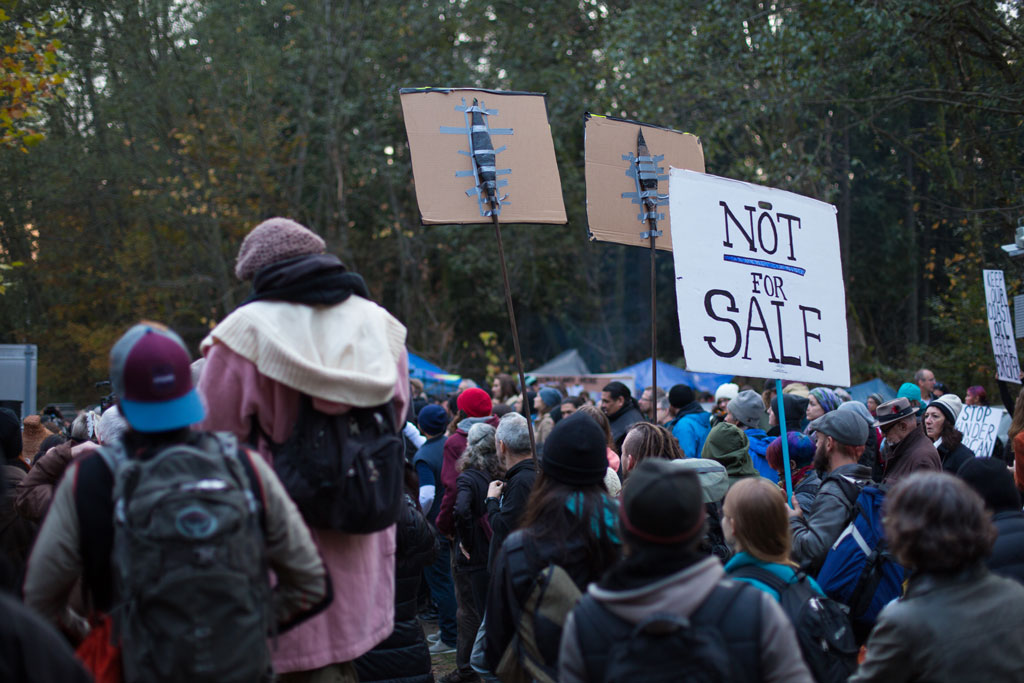By Kodie Cherrille (The Cascade) – Email
Print Edition: November 26, 2014

An education revamp threatens scholarship for the sake of trades. An already-famished post-secondary institution has to “tighten its belt” once again after another huge cut in funding from the government. Habitual, incessant slashes to liberal arts and humanities programs that, by the day, look more and more like the complete disembowelment of a whole way of life. It’s been a fiscal doozy of a semester for UFV.
Meanwhile, protestors have planted themselves on Burnaby Mountain, blocking Kinder Morgan surveyors from beginning their work on an expansion of the Texas-based oil corporation’s Trans Mountain Pipeline System. Those defying the BC Supreme Court’s injunction risk being arrested.
These two scenarios are very closely related — they are both a pipeline issue. While one scenario seems obviously so, the other might need some explanation.
To prepare the province for the pending jobs promised by the pipeline, the BC government has created a new education blueprint, which intends to shift the emphasis of post-secondary institutions from academic to trades-oriented. The slogan they came up with was “learners to earners” — a slogan inherently contradictory when used in the name of education.
That being said, the government is supposed to act in the best interests of its people. If it perceives the best interests for this province are those of the Kinder Morgan and Northern Gateway pipelines, then it is their responsibility to make those prospects a reality. This includes giving citizens the means to acquire skills that will help them capitalize on the project. But is it really in the best interests of the people? Looking at the huge outpouring of criticism and protesting, I question how many people are really behind this project, and in whose interests the pipeline serves. If this government’s decision represents the best interests of the people, why is there so much dissent?
Is it possible the new BC education blueprint has a second motive? Is it possible the BC government sees the amount of criticism they face in investing in these pipelines, and have deliberately shifted the education system to stifle critical thought? Whether this is intended by the government or not, critical thought will indeed be stifled if there is no education that directly fosters it. This sentiment echoes an editorial by The Cascade’s editor-in-chief, which covers in more detail the educational implications of the revamp ( “A university in name only: The re-engineering of BC education poses a significant threat to scholarship,” Volume 22, Issue 24).
Interestingly, the discussion on education funding cuts has not, as far as I’ve seen, dwelled much on the pipelines. Rather, there is a sort of unfocused discontent among liberal arts students (or, at least, the ones I’ve talked to), as if it is directly the university’s fault. But no one at UFV wants to see programs fail, or get funding cuts. No one wants to see our professors — who have put so much into their students and community — be underpaid or let go.
It is of utmost importance we recognize the source of such a feeling of alienation: the pipelines. The BC government is putting out policies that are influenced by the pipelines. In expectation of specific jobs, the education system has been changed. If students are discontented with the change in education, it follows they should protest against the thing that effects those changes.
This takes us back to Burnaby Mountain. It becomes clear, in this train-of-thought, why Kinder Morgan has singled out two SFU professors in the ongoing legal dispute. One professor teaches biochemistry, the other teaches literature. As such, they represent the two primary critical voices of the pipelines: environmentalists, and students with the capacity for interpretation and critical thinking — students ostensibly left out of the government’s grand, golden plan for BC’s future.
Until we see that the promised pipelines are the direct influence of our declining state of academia, the education system will remain locked into the “learners to earners” mentality. How many people does the government have to displace in the name of cashing in, before we see that the pipeline, as proposed now, must go?


